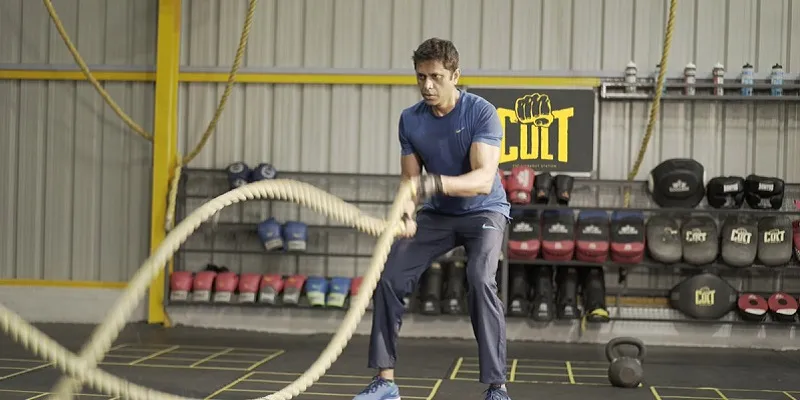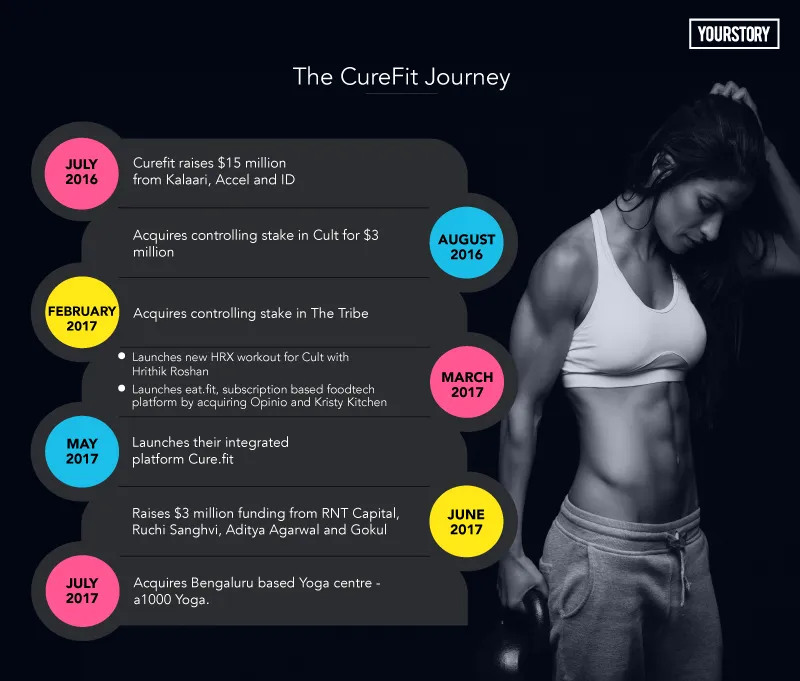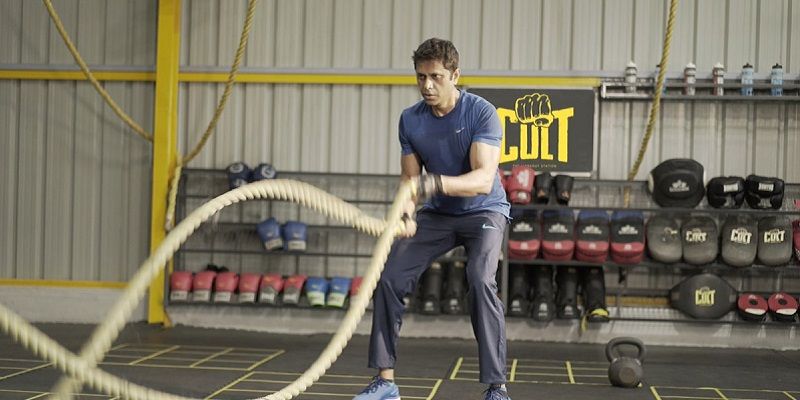With CureFit, Mukesh Bansal wants to jumpstart a fitness movement in India
Mukesh Bansal and Ankit Nagori’s CureFit combines engagement, coaching and delivery through a mix of online and offline channels. With 5 acquisitions and 2 rounds of funding, the firm aims to be a $100m revenue company in less than two years.
A 40-year-old entrepreneur who already has a successful exit to his credit, Mukesh Bansal is all set to conquer the world of health and fitness with CureFit.
His earlier venture, Myntra, was acquired by Flipkart in 2014 and Mukesh went on to become the head of commerce at Flipkart. But entrepreneurship came calling again, and he left Flipkart in 2016.
For those who know Mukesh, a startup in this sector doesn’t come as a surprise. A known fitness enthusiast, Mukesh begins his day early and works out five to six times in a week.
CureFit was launched in April this year by Mukesh, who also was the head of commerce at Flipkart, and ex-Flipkart Chief Business Officer Ankit.
The platform caused a stir well before its launch. Being a second-time entrepreneur comes with its perks and benefits. While Mukesh looks at the CureFit journey differently, he agrees that funding and hiring are easier this time round.
When I meet Mukesh at his cozy, yet spacious, office at HSR Layout in Bengaluru, it is 12 in the afternoon and he has already clocked 9,800 steps and ordered a healthy meal on eat.fit, which is a part of CureFit.
“Today, it feels like a familiar zone; I feel comfortable. For people who are just starting out, raising $3 to $4 million takes at least a year,” Mukesh says.
In July last year, CureFit raised one of the highest first rounds of funding in the Indian startup ecosystem with $15 million from Accel Venture Partners, IDG Ventures and Kalaari Capital - even before there was a definitive platform in place.
But Mukesh says that every time is “different”.
“It’s about forgetting past learnings and starting with a clean slate. Sometimes past learnings can be a handicap or blind spot,” he says.
Speaking of her experience with Mukesh, Vani Kola, Managing Director, Kalaari Capital, says,
“I think Mukesh is a very mature and evolved person. It comes across in everything he does. The way he works with his investors and employees is testimony to that. He sets the bar high.”
Kalaari was an early investor in Mukesh’s first startup, Myntra, and Vani’s association with Mukesh has been long.

Making acquisitions along the way
In 2016, CureFit invested $3 million and got a majority stake in Bengaluru-based fitness startup Cult.
“I had liked the unique no-machine workout model that Cult was working in and it was something I wanted to scale across. When we acquired Cult, it had one centre. Over this year, we have opened close to 15 Cult centres in Bengaluru,” Mukesh says.
The team launched a unique HRX workout with Hrithik Roshan, and also acquired the fitness club The Tribe, B2B logistics startup Opinio, and online foodtech company Kristy Kitchen. CureFit has also signed up Hrithik Roshan as its brand ambassador
After all these acquisitions and launches, CureFit launched its app as an integrated platform with three verticals - cult.fit for physical fitness, eat.fit for healthy and nutritive food intake guidance, and mind.fit for mental wellness offerings.
“After Flipkart, I thought I would take a three to six-month break before starting something new, but after a month I started getting bored. Ankit and I were moving out at the same time and we would look at different things to focus on. We decided to focus on preventive and curative health,” says Mukesh.
Healthcare, Mukesh and Ankit realised, was big and affected every single individual.
The co-founders gave thought to the different health services one could receive on mobile phones, and planned CureFit as an amalgam of mental wellness, physical fitness and a balanced diet.
Taking a holistic approach
Mukesh says India doesn’t have an established and large healthcare system and most people are without healthcare insurance. Globally there is a lot of technological innovation in this space, but India has a long way to go.
What does an individual need for a healthy lifestyle? It begins with proper and relevant information about physical and mental health, food, and fitness.
With CureFit, the founders are looking at a holistic and integrated approach to preventive and curative healthcare. CureFit’s short-term goal is building strong preventive healthcare offerings. In the next six to nine months, it is considering adding health checkups on primary care.
“Living a healthy lifestyle involves a lot of work, so people who are extremely motivated are able to pull it off as they know where to go and what to do next. But not everyone is that motivated. So if we want to help people solve their health problems, we need to make it really easy for them. Curefit acts as one platform where everything is available. We want to be an end-to-end, healthcare-focussed platform.”
All Cult centres offer trainer-run group classes; there is no equipment. As an individual, you can get lost in what to do in a gym; with Cult, every hour is with a group, and that itself is a motivation.
Evangelists bring more evangelists
“Most of the trainers we have at our centres are former athletes, state level and national level. There are several players and after a short stint in sports, they have limited career opportunities. They have an understanding of fitness and they are able to impart a different kind of training. Cult offers a unique proposition, which no other fitness centre does,” Mukesh says.
Initially, the team is targeting people looking for a lifestyle change.
As of May this year, Cult had over 5,000 members. Mukesh believes these are people who are already motivated and can work as evangelists.
However, understanding that fitness isn’t part of the lifestyle in India, the CureFit team believes that the celebrities they are collaborating with will work as evangelists. They have also tied up with a radio show, where they have 15 spots with three domain experts - Shyam Bhat for meditation, and Shwetambari Shetty and Rishabh Telenga for fitness. The idea is to create awareness.

How the acquisitions helped
Currently, they follow a monthly subscription revenue model for Cult and weekly subscriptions for eat.fit. The team claims to have over 10,000 customers and a revenue run rate of $5 million per year in less than 12 months.
“We will be a $100m revenue company in less than two years,” Mukesh says.
But each vertical of CureFit is like a business in itself. While the year has been aggressive for Cult and the fitness centres, CureFit also has a mental wellness and online-food subscription model.
This is where all the acquisitions that CureFit made have helped it grow. Starting and setting everything from scratch would’ve been a challenge. With several acquisitions, it becomes easier for CureFit to work on operations and scale.
Mukesh says CureFit follows a sequencing model, and this year the focus was on aggressively launching and pushing Cult. On the food side, the team realised that the problem is that healthy and tasty food isn’t available.

Making food scalable
“With eat.fit we are trying to replicate home food, with the ingredients, recipes and even the way the kitchens are designed. All this helps in creating a hygienic and controlled environment. Instead of simple rotis, we have methi rotis; we add a healthier ingredient. We also provide a super food everyday with lunch that include walnuts, or seeds,” Mukesh says.
Eat.fit has also launched cheeseless lasagne and butterless butter chicken.
While there are several food delivery startups, few have successfully been able to scale and grow the subscription model.
Mukesh believes that this is because if one starts by servicing all of Bengaluru, “you can look only at one delivery per hour, which will kill the unit economics.”
Now, with just a few locations, CureFit claims that they are doing five to 10 deliveries per hour. Once the basics are in place, then hiring, setting of processes and getting the menu right depend on setting the right quality controls and checks in place.
Bringing in the tech play
It’s a food business, but technology has a big role to play. Mukesh believes the only way they can scale and bring consistency is through technology.
The consumer-facing app gets integrated with the phone, gives the steps data, sleep data etc, for which you get credits. On the backend side, all Cult processes are ERP managed.
“For trainers, we have a trainer engagement app, which provides them communication training, it also gives them notes and pointers where they can upgrade their skills,” Mukesh adds.
Each individual’s app shows a dashboard of the meal offered and the workouts subscribed to.
The screen evolves into a coach - it gives you reminders, has a dashboard on what you have done and also gives you reward points. You have to do one healthy activity – sleeping seven hours, 10,000 steps, a DIY workout, meditation or eat an eat.fit meal. If you don’t do any of these no activity for a day, there is a slight nudge and reminder.
It is estimated that around four billion transactions happen in the healthcare sector every year In India. Over the past few months, the healthtech sector has been abuzz with activity, with startups getting involved in hospital management systems, doctor discovery, delivery of medicines, and the now-crucial home healthcare services.
Many are focussed on becoming a complete healthcare provider. Tencent and Sequoia-backed Practo recently rebranded itself as a complete healthcare platform. Wearable Goqii looks at healthcare with a coach-based model.
“Many of the other models are driven with human intervention. The problem with that is that it isn’t consistent. Human coaches in that sense aren’t scalable. The app needs to get smarter and smarter,” Mukesh says.
The Curefit team is considering a tech-enabled focus to even mental health.
“We want to tackle counselling through tech. There are only 4,000 psychologists for 1.3 billion people. So we believe to make an impact, we need tech-based solutions. We want to be a movement that brings fitness to India,” Mukesh says.











